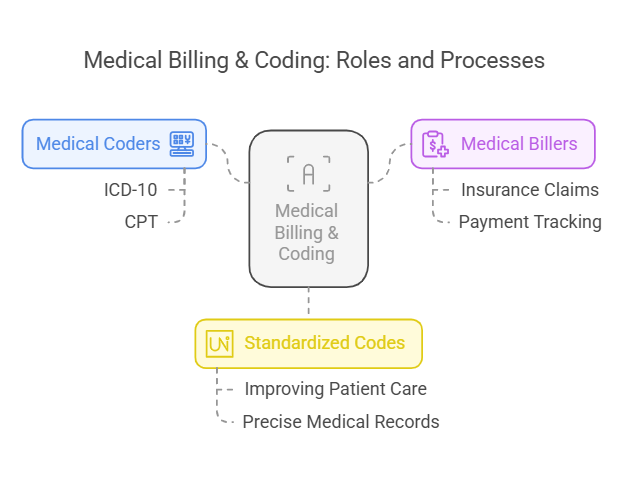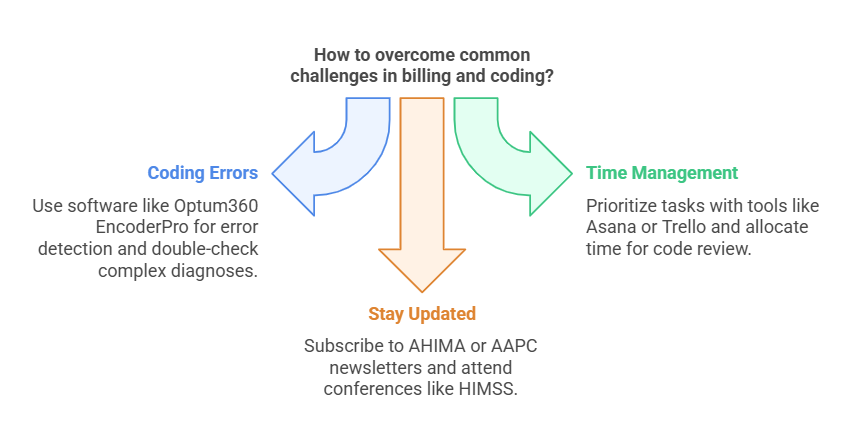Entry Level Medical Billing And Coding
Medical billing and coding are essential components of the healthcare industry. They ensure the accuracy of processing patient records, insurance claims and medical invoices. The field of healthcare continues to grow and evolve with the technological advances.
This 2025 comprehensive guide explores the skills, certifications, medical billing and coding certificate, and job opportunities that are essential to a career in medical billing. You can explore key topics by clicking on external links.
Understanding Medical Billing & Coding
The medical billing and coding is a vital part of healthcare administration. This field's professionals ensure that healthcare providers are paid on time for their services. They do this by translating medical procedures to standardized codes.
How it Works:
Medical Coders: Assign codes for diagnoses, treatments, and procedures based on standards such as ICD-10 , CPT, and ICD-10 .
Medical Billers: These codes are used to track payments and billing inquiries, as well as prepare and submit insurance claim forms.
According to American Health Information Management Association, accurate coding improves patient care by ensuring that medical records are precise.
The Essential Skills of Medical Coding and Billing
Professionals in the field of engineering must combine technical knowledge with critical reasoning and interpersonal skills.
Key Technical Skills
Expertise in Coding Systems
Understanding systems such as ICD-10 CPT and HCPCS for accurate documentation and claim processing is essential.Medical Terminology
Coding is only possible with a solid understanding of anatomy, physiology and medical terminology.Healthcare Regulations:
HIPAA compliance and confidentiality are ensured by familiarity with the law.
Developing Soft Skills
Avoiding coding errors will prevent claim denials.
Analytical thinking: Interpreting medical records with accuracy.
Communication Skills: Working with Healthcare Providers and Insurers
Practice coding regularly to improve your accuracy and speed. Beginners can benefit from online resources such as AAPC practice exams.
Upgrade Your career with Certification Pathways
Although certification isn't mandatory, earning a credential that's recognized by employers and potential employers will increase your employability.
Top certifications for 2025
Certified Professional Coders (CPC) (AAPC).
The course focuses on the coding of outpatient services, which is a crucial skill for physician offices and clinics.Certified Coding Associate CCA (AHIMA)
A certification that covers a variety of healthcare settings.Certified Billing and Coding Specialists (CBCS):
Validates billing, coding and insurance processing skills.
Why certification is important
According to the AAPC Salary survey, certified professionals earn 17.7% more than non-certified counterparts.
Certifications are a sign of expertise and commitment to learning.
Most employers require that you have at least one certification.
You can choose certifications that are aligned with your career goals, whether it is outpatient coding or inpatient services.
The Future of Medical Coding and Billing
The healthcare industry is changing rapidly. You can gain a competitive advantage by staying informed of these trends.
1. Artificial Intelligence and Automation
AI-driven tools can now detect errors and predict denials of claims with incredible accuracy. Natural language processing (NLP), as used by software solutions such as 3M CodeFinder, improves coding efficiency.
2. Telehealth Expansion
This trend will continue in 2025. Billing practices are now incorporating virtual care codes such as the CPT Telehealth Service List.
3. Cybersecurity and Medical Billing
Securing patient data has become more important as the digitization of healthcare increases. National Institute of Standards and Technology offers guidelines on how to secure electronic health records.
4. Blockchain as a Data Integrity Tool
Blockchain technology is used to create transparent and tamper proof patient records. According to Health IT News the adoption of blockchain technology in healthcare will grow by 42.5% per year through 2025.
How to find entry-level medical billing and coding jobs
There is a high demand for medical billing and coding professionals in a variety of healthcare settings. You can search for job openings in the following places:
Healthcare Facilities:
Hospitals (e.g. general, specialized or teaching)
Urgent care and outpatient clinics
Long-term care facilities and rehabilitation centers
Insurance Companies
Coders are often hired by medical insurance companies to audit and process claims.
Remote Opportunities:
Remote coding jobs are in high demand due to the growth of telehealth.
Many companies, such as Change Healthcare or Optum, hire remote professionals.
Tip: Use niche job boards like HealthJobsNationwide and MedicalBillingAndCoding.org for specialized job listings.
Build Your Career with Networking and Development
Medical billing and coding careers require networking to grow. Here are some strategies that work:
Join professional organizations:
Local chapters, workshops and webinars are available through AAPC.
AHIMA offers resources, certifications and networking events.
Attend conferences and webinars:
Attending industry events will keep you informed of regulatory changes and coding updates.Use LinkedIn to your advantage
Join healthcare administration groups and join discussions.
Pro tip: When attending networking events, create a short elevator pitch that highlights your experience and certifications.
Salary Expectations in 2025 and Regional Insights
Salary levels in medical billing and code vary depending on certifications, experience and location.
Averages across the country:
Entry-Level: $35,000. - $45,000 annually
Career mid-career: $50,000 to $65,000 per annum
Experienced Coders (5+ Years): $70,000+
Highest-Paying States (2025 Projections).
California: $67.660 per year
Washington, D.C. : $70,900 per year
New York: $65,480 per year
Source: Bureau of Labor Statistics
Overcoming Common Challenges
Even professionals with extensive experience in billing and coding face challenges. Here are some of the most common challenges.
1. Coding Errors:
Use software like Optum360 EncoderPro for error detection.
Double-check all entries, particularly for complex diagnoses.
2. Time Management:
Prioritize your tasks using tools such as Asana or Trello .
Set aside time for the review and update of codes.
3. Keep up to date:
Subscribe to the newsletters of AHIMA or AAPC.
Attend conferences such as the HIMSS Global Health Conference.
Future Outlook: Why choose medical billing and coding in 2025
Demand for billing and coding professionals will continue to increase through 2030.
A growing population demands more healthcare services.
Digital Transformation: the shift to electronic records is continuing in healthcare facilities.
Telehealth Expansion - Virtual care services have become mainstream and require new coding standards.
Employment Growth:
Bureau of Labor Statistics projects a 8% increase in the number of medical records and health data technicians between 2023 and 2030. This is higher than the average growth rate for all occupations.
Keep up to date by keeping abreast of new fields such as clinical documentation improvement (CDI), risk adjustment coding, and other emerging areas.
Last Thoughts on Your Path to Success
To succeed in the field of medical billing, medical coder training, and coding, you need to be dedicated, pay attention to details, and learn continuously. You can achieve long-term success by obtaining certifications, learning key skills, and staying up to date with industry trends.
FAQs on Medical Coding and Billing (2025).
1. What are the best certifications for beginners?
The best certifications for beginners in medical billing and coding include the CPC (Certified Professional Coder) from AAPC and the CCA (Certified Coding Associate)
2. How long does it usually take to become certified?
The time to become certified in medical billing and coding varies, typically ranging from 4 months to 2 years, depending on the program and certification chosen.
3. Is medical billing & coding a job that is suitable for remote workers?
Yes, medical billing and coding is well-suited for remote work, as most tasks involve processing patient data, insurance claims, and coding services using specialized software.
4. What will be the average salary for new coders by 2025?
Professionals at the entry-level can expect to earn between $35,000 and $45,000 per year.











